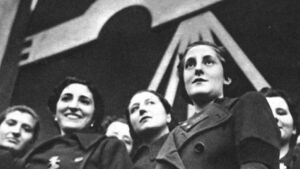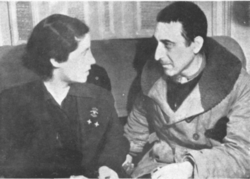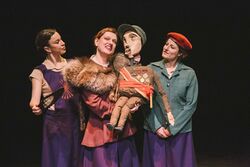Roberta II
| Roberta II | |||||||||
|---|---|---|---|---|---|---|---|---|---|
| The Functionalist Queen | |||||||||
| File:Roberta.jpeg Roberta II in 1924 | |||||||||
| Queen of Paretia | |||||||||
| Reign | 17 July 1921 - 1 October 1933 | ||||||||
| Coronation | 17 July 1921 | ||||||||
| Predecessor | Lourenço III | ||||||||
| Successor | Position Abolished | ||||||||
| Chairwoman of the Women's Section of the PNNP | |||||||||
| Reign | 28 April 1923 - 1 October 1933 | ||||||||
| Predecessor | Position Created | ||||||||
| Successor | Position Abolished | ||||||||
| Lady of the 7th of November Movement | |||||||||
| Reign | 5 November 1925 - 1 October 1933 | ||||||||
| Predecessor | Position Created | ||||||||
| Successor | Position Abolished | ||||||||
| Born | 7 September 1900 Precea, Luzela | ||||||||
| Died | 6 September 1985 Jardinagem, Luzela | ||||||||
| |||||||||
| House | Pavillon | ||||||||
| Father | Lourenço III | ||||||||
| Mother | Lúcia Duartes | ||||||||
| Religion | Solarian Catholic Church | ||||||||
| Military career | |||||||||
| Allegiance | |||||||||
| Years of service | 1914-1933 | ||||||||
| Rank | Marechal-general | ||||||||
Roberta II (Roberta Sofia Susana Pilar de Pavillon; 7 September 1900 - 6 September 1985), was Queen of Paretia from 1921 to 1934. She ruled the nation during the Functionalist Period of the country's history, alongside Premier Carlos Palmeira.
Roberta was the second child of Lourenço III, she became the heir after her older brother's death. She would become infatuated with functionalism in her later youth. Her father was greatly worried about his daughter, he tried to steer her away from it but he would die in 1921. She became Queen and would support the PNNP of Carlos Palmeira, eventually becoming a member of the party in 1923. She became the leader of the Feminine Section of the party.
After the 1925 election of Xulio Sousa she would organize a coup to install Palmeira and the PNNP into power. Afterwards she became a leader of the 7th of November Movement, a totalitarian functionalist government. She would help with the formation of groups like the female section of the Reservistas and would be close with much of the PNNP's top members.
She would help Palmeira enact functionalist laws and reach out to functionalist nations worldwide. Calling for a "functionalist world order" in which all nations in the world are functionalist. She would become a figurehead of the government, a national symbol for the functionalist regime.
She would rule the country during the Great War and would give the famous speech for the country's entrance into the war, known as the War on Democracy speech. Roberta II continued her role as an ally and friend to Palmeira as figurehead of the country. She would eventually be captured by allied forces in 1933 when Precea fell, she would sign the official surrender of Paretia. Later she would be put on trial for crimes against humanity, she would be imprisoned for 40 years afterwards. After her imprisonment she lived a secluded life and died of old age in 1985.
Early life
Roberta was born on September 7th 1900, and was the second child of Lourenço III, whos rule at the time saw economic prosperity in Paretia. She was born alongside her older brother and heir Américo and younger sister Teresa. Her early childhood was mainly dull, until the death of her brother to influenza in 1913, saw her rise to the title of heir. Lourenço III was worried that she would not have enough experience to become Queen of Paretia. At the time the Great Collapse, various revolutions in other nations, and the rise of functionalism was concerning to her father, and he enlisted her into military training at the age of 14, where she learned battle logistics and weapons training. She was then enrolled in a political philosophy school in 1918.
Here she learned a great deal of functionalist ideology, namely from it's early thinkers, she also is said to have read many of the works of Gaëtan de Trintignant. In 1919 she visited the royal family of Gaullica, which she was said to become very close friends with, including price Constantin III. She visited Parti Populaire rallies many times. In 1920 she was greatly supportive of their takeover of Gaullica, and began to become more and more infatuated with functionalism. Her father became greatly concerned, as he was very much an anti-functionalist, he later even was once quoted in saying he was "worried about these new radical parties, and, even more so worried about my own daughters love for them. I don't have much time left as I grow more ill by the hour, all I wish is the future of my nation will not be an authoritarian mess, especially in a world like this. But it appears I cannot help her realize this, I am greatly worried she will join them."
Lourenço III and Premier José Monteiro in 1921 began to ban functionalist and socialist literature, including from Roberta herself. She is said to have believed her father was at fault for the worsened the state of Paretia after the Great Collapse. Roberta began to listen to the speeches and read the works of Carlos Palmeira, a rising functionalist leader in Paretia, who she eventually met in 1921. Later in the year Lourenço III would die of lung cancer, and Roberta would then ascend to the throne.
Early rule and rise of PNNP
Her first year as Queen was met with changes to much of her father's work, including protection for non-Solarian Catholic churches, which was reversed, and was supported by the PNNP. She also increased Paretian troops in the country, and cracked down on independence movements in the various kingdoms. However much of her other attempts at changes were blocked the Premier José Monteiro and the ruling Civil Congress and their allies in the coalition government. The 1922 election changed things for Roberta, it saw massive growth of the rising PNNP lead by Carlos Palmeira.
Although Monteiro was replaced by Duarte Bonafacio and the Paretian National Conservative Party, Bonafacio did little to stop Roberta and her more functionalist policies. Later in 1922 she visited Functionalist Gaullica and met with King Constantin III and Minister Rafael Duclerque, both functionalists, and was stated to have asked for help in bringing functionalist victory to Paretia. Roberta II's closest friend would eventually marry Carlito Palmeira. She later ended up join the PNNP in 1923.
As part of her newfound position in politics. She would dawn a new outfit that follows the unisex clothing style of functionalist fashion, rejecting her royal outfit that she once wore. She would wear functionalist symbolism on her clothing as well.
She soon became the leader of the Feminine Section of the PNNP, and a powerful player in the party itself, as well as a close ally and friend of Palmeira. She would attempt to back the PNNP in the 1925 election, which the party was threatened by the rising Democratic Party of Paretia lead by Xulio Sousa. 1925 in Paretia became particularly violent as street brawls between the far-right and far-left became common in order to instill fear in their political enemies. The government of Bonafacio did little to stop Roberta II and Palmeria's rise.
The 1925 election however saw the PNNP narrowly defeated by the PDP and Sousa. Palmeira claimed the election was fraudulent and did not accept the results, followed by Roberta, who refused to appoint Sousa to Premier. She eventually was forced to as the Senate of Paretia was about to strip powers from the monarchy, this lead to Sousa being Premier for little less than a month, while he was Premier Roberta met with military commanders, who by then were far more aligned with Palmeira. They would be able to stage a coup in order to get Palmeira into power, kwnown as the Eventos de Novembro, Roberta II would order the military to take over Precea and have Sousa and all of the members of the PDP arrested and exiled to Etruria. She would then proceed to appoint Palmeira as Premier of Paretia, in which began the creation of the functionalist state.
Pre-war functionalist rule
Roberta II would become the figurehead of the Paretian government, although must of the power of the government rested in Palmeira. The PNNP Feminine Section would expand in size greatly. The 7th of November Movement, under the Coalition Decree, would let other right-wing elements, including traditionalists, catholics, and monarchists, join their government. This lead to the expansion of the ONJ, PNNP, and Reservistas. Roberta advocated for a female section of the Reservistas be created, it would be and became known as the Pérolitas.
Roberta II became close allies with Inteior Minister Rafael Azevedo and Propaganda Minister Hèctor Clar. Clar would have Roberta II become a symbol of the government by letting her give speeches on the newly introduced television and radio broadcasts.
Roberta II would visit numerous functionalist nations after the rise of the PNNP, including Gaullica, Amathia, Blostland, and Piraea. She and Palmeira would form what they called the "Luzelese cultural alliance" with functionalist Ardesia. A close friend of Roberta II, Filipe Noronha, would be made Foreign Minister of Paretia in 1926.
Clar and Roberta II would use the newly created Paretian State Radiotelevision to give her public broadcasts to Paretians. Roberta II would work together with other Women's Sections of functionalist parties in Euclea and across the world.
With global tensions in Hennehouwe and South Coius growing in 1927. Roberta II would call for the creation of a "functionalist world order" saying that one day all nations of the world will be functionalist.
With the outbreak of war between Estmere and Gaullica following the Second Sakata Incident in Coius, Palmeira and the government would align itself with the Entente, and would become a major agricultural supplier for Gaullica during th initial year of war. Etruria then declared war on Gaullica in 1928, Palmeira and Roberta II followed suite declaring war on Etruria. She would announce this in a public broadcast. This speech became Roberta II's most famous speech, known as the War Against Democracy Speech. The most well known excerpt calling to free their enemies from democracy.
"- Our brothers and sisters in Gaullica call for our aide against the democratic plague. Look at what democracy thinks of our ally, they bomb them in a surprise attack near our shores. We must bring the truth to those nations, the truth of National Functionalism, we will save the Etrurians, Weranians, Soravians, Senrians, Estmerish from their chains, we are not at war with the people of these nations, but the democracy that infects them. God is with us, the tomorrow of the sunrise kingdom and the world will be beautiful, a tomorrow that will last millions of years. We must make sure this tomorrow is possible, the threats that our nation face will not last, our children will look back at their forefathers and see that what we do now has ensured their prosperity for beyond time. Our children and nation count on us and our allies, people of Paretia, prepare yourselves, this task must be done. War against democracy has begun."
Great War
In 1927 Paretia had a small volunteer unit send to support Gaullican forces in Tsabara, but it remained out of the war at first. But after Etruria's entrance into the war, Paretian emassed it's army into battle. Etruria would invade Paretia in 1928.
This attack was stopped in the Battle of the Palmeira Line, an early Paretian victory that lead to Etrurian forces being pushed back into Etruria. Roberta II would visit the front lines during the attempted push to take the Etrurian city of Turania, known as Operation Teatro. During which the Bulaga Massacre occured. However the Battle of Turania proved to be a failure for Paretian and Gaullican forces and they would be pushed back into Paretia by 1930. Etrurian forces however were again slowed down before they could reach the Espiesa River and Teradad. The front line became stagnant. During the war Roberta II would make numerous speeches about the war effort, many of which were giving false news about Paretia's war situation. Paretian and Gaullican air forces would attack the island of Emessa throughout 1929 to 1931. Roberta II would make visits to her ally Gaullica many times during the war.
In 1931 the warfront was becoming more thin and desperate for the Entente, resistance movements in Paretia began to grow more effective and sabotaged the war effort for the military fighting against Etrurian forces. Etrurian forces by summer 1931 reached the bank of the Espiesa River, and began to make gains in the north along the Gaullican border to flank both Gaullican and Paretian forces.
In 1932 the Battle of Chineta saw the Paretian lines in southwest Esmeira broken through and the Paretian forces pushed back across the region. Roberta II would sign a decree for all able-bodied Paretians to prepare for full-scale war across Paretia. Teradad fell quickly after, and in late 1932 so did Ocerto. Paretia's navy was destroyed by late 1932 and bombing campaigns on the cities of Precea, Encerosa, and Herança became more devastating. By the end of 1933 Etrurian forces captured Encerosa and encircled Paretia, and in August 1933 Precea was captured. Palmeira was captured by Etrurian troops and shot without trial. Roberta II officially surrendered in September 1933.
Trial and sentence
Roberta II was captured by Etrurian troops in Precea and, ulike Palmeira, was not killed. She would be forced to sign a treaty of Paretia's unconditional surrender to the Grand Alliance. She would be imprisoned in Emessa until her trial at the broader Rayenne Trials in Rayenne, Gaullica.
Roberta stated at the trials "I know what I did and it was for the betterment of my people, if not for the military failures of our nation I would be a hero to you people, because if only we had won we would have shown you people the light that was and is National Functionalism."
Initially, the Grand Alliance saw her as not only a puppet figurehead but a partner alongside Palmeira in running the PNNP, and saw her actions more egregious than those of Emperor Constantin of Gaullica. The debate over he sentence became between imprisonment or death penalty.
Etrurian and Soravian jurors were staunchly in support of the death penalty for Roberta, whilst the Estmerish and Weranians were looking toward a more lenient punishment, to them she was only a figurehead, not an active ruler like Palmeira. However, after debate between the two sides, Soravian jurors came to side with giving her a lighter sentence than death. She was sentenced to 40 years imprisonment, one of the longest at the trials.
Later life
She would go on to serve her full sentence, she gave numerous interviews during her time in prison. After her imprisonment she would live a secluded life away from the public eye, she would occasionally speak at neo-functionalist events.
But she remained quiet for much of her later life. During an interview with a Le Monde journalist, she was asked if she still believe in functionalist like it was, she responded "I do, but the world is poisoned beyond the point of coming to the truth. I do not believe the people of this world are going to realise what a magnificent time it was."
She would die of old age on the day before her birthday, 1985 at age 84.
Personal life
Roberta II had never married during her lifetime, although she was thought to have had imtimate relations with others, but she never bore children. Functionalists in Paretia, including foreign minister Filipe Noronha and Carlos Palmeira himself, had pushed for an arranged married between Roberta II and Rafael Duclerque, in order to form a marital connection between the Paretia and Gaullica. Despite Palmeira's support, Roberta II rejected the idea, although she is stated by Francisca Fraga to have been "greatly flattered by the proposal".
Roberta's best friend, Francisca Fraga, was a train engineer who she had helped into marrying Carlos Palmeira as his second wife after his first one had died years earlier. Fraga's memoir Me and My Best Friend: Recollections of Francisca Fraga described Roberta II's support for the marriage as a favor to to Palmeira and a show of loyalty to the party.
Legacy
Roberta II is often considered one of Paretia's most important monarchs, and often ranks high on lists of importance for Paretia's monarchs. Alongside Marta I, Roberta II is often considered one of the most important female leaders of Paretia, usually ranking second behind Marta on lists.
In popular culture
Roberta II is often depicted in a negative way since the end of the Great War, as do many other functionalist leaders. She is often used as a symbol of the feminine side of functionalism, as well as the monarchist side of functionalism.
Roberta II is depicted by actress Rita Albuquerque in the 2022 film Me and My Best Friend, which depicts the life of Francisca Fraga, Palmeira's second wife and best friend of Roberta II. It is known for it's depiction of Roberta II's involvement in Paretian functionalism
In the Gaullican film Rise of Duclerque, Roberta II makes an appearance when Rafael Duclerque visits Paretia, portrayed by Constance Vérany
In the Paretian TV miniseries Palmeira: Story of the Chief, Roberta II is depicted often and played by Ana Visego
Roberta II is depicted in the popular Paretian play "A Seção", which depicts the Feminine Section of the PNNP








